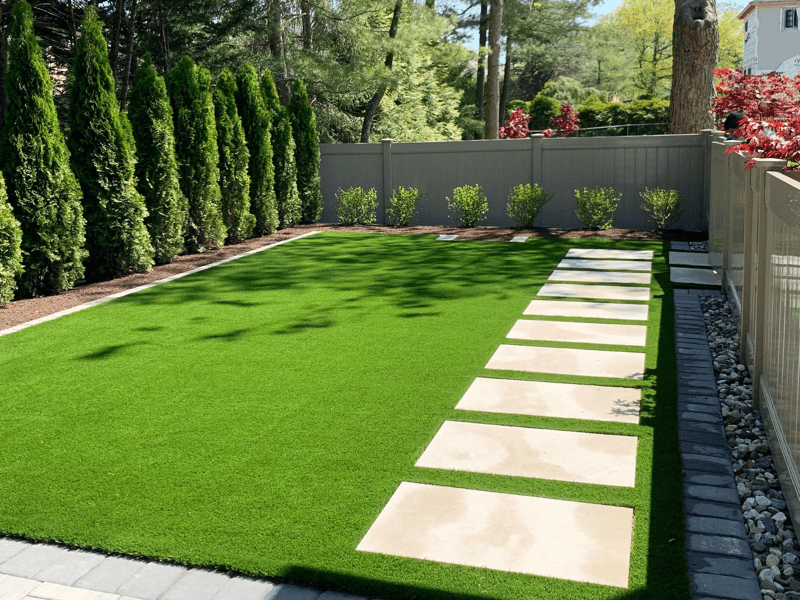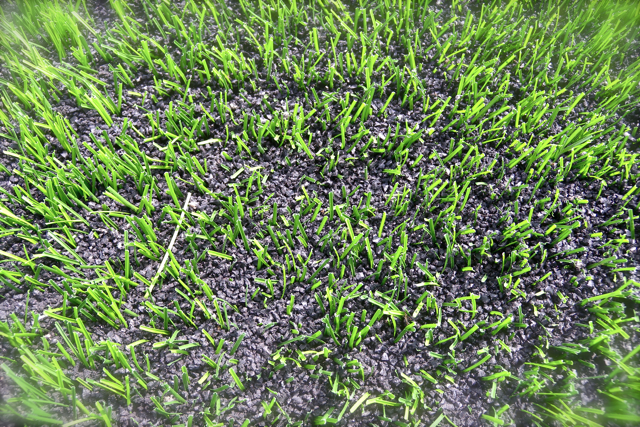Delve Into the Environmental Advantages of Opting for Synthetic Grass Solutions
The adoption of fabricated grass solutions offers an engaging opportunity to address pressing ecological difficulties. By substantially decreasing water use and reducing the application of hazardous chemicals, these options not only promote sustainable landscaping yet likewise safeguard local environments.
Water Preservation Conveniences
One of the most considerable advantages of artificial grass is its capability to save water. In comparison, synthetic turf does not require watering, significantly minimizing the general need for water resources.
By removing the requirement for routine watering, synthetic turf adds to sustainable landscape techniques and helps reduce the ecological influence of extreme water usage. The preservation of water extends to the reduction of overflow, which can lead to soil erosion and river contamination.
Additionally, the setup of synthetic grass enables property owners and municipalities to assign water sources a lot more successfully, concentrating on vital uses such as alcohol consumption water and agriculture. The shift in the direction of man-made lawn not just promotes accountable water usage however also aligns with more comprehensive environmental objectives targeted at protecting all-natural resources.
As areas significantly prioritize sustainability, the water conservation benefits of synthetic grass provide a compelling case for its fostering in residential and business landscaping tasks.
Lowered Chemical Use
The transition to synthetic lawn considerably reduces the reliance on chemical therapies frequently made use of in natural turf maintenance. Conventional lawn monitoring typically involves the application of chemicals, herbicides, and plant foods to promote development and control insects. These chemicals can posture dangers to human health and wellness, regional wild animals, and the environment, contributing to dirt and water contamination.
In comparison, fabricated turf eliminates the need for these harmful materials. By lessening the release of artificial substances right into the ecosystem, fabricated grass promotes healthier dirt and water systems.
Furthermore, the absence of chemical runoff linked with man-made turf setups assists protect local waterways from air pollution, sustaining water life and keeping biodiversity. Artificial turf companies phoenix. As areas progressively prioritize sustainable practices, going with synthetic grass provides a feasible service that straightens with ecological preservation goals. Via this shift, homeowner can take pleasure in rich eco-friendly spaces without compromising eco-friendly health, leading the way for an extra sustainable future
Lower Carbon Impact

Moreover, the installation of man-made grass can result in substantial water preservation. All-natural lawns call for significant quantities of water for watering, which not only includes in the carbon footprint associated with water extraction and treatment yet also stress local water resources. On the other hand, synthetic grass needs marginal maintenance, calling for no watering, thus significantly decreasing water use and its connected energy expenses.
In addition, the durability of synthetic grass adds to its decreased carbon effect. With a life-span of approximately 15 years or more, the need for regular replacements is lessened, causing less waste and lower energy intake in production and dealing with standard turf alternatives. Generally, artificial lawn presents a sustainable alternative for ecologically aware landscape design.
Environment Preservation
Habitat conservation is a vital consideration in the discussion over landscaping choices, particularly when contrasting fabricated grass to natural lawn. All-natural grass yards commonly call for comprehensive maintenance, consisting of using chemicals, herbicides, and plant foods, which can adversely influence local environments. These chemicals can seep right into the dirt and rivers, hurting native plants and fauna and interrupting local environments.
On the other hand, synthetic lawn presents a possibility to reduce the eco-friendly footprint of landscaping. By choosing artificial turf, property owners can lessen the disruption of all-natural habitats related to traditional lawn treatment practices. Synthetic grass gets rid of the demand for harmful chemicals, thereby safeguarding nearby wildlife and maintaining the honesty of bordering Your Domain Name ecosystems. The setup of synthetic lawn can lead to the conversion of former yard locations into even more biodiverse landscapes, such as pollinator gardens or indigenous plant areas, which can support local wildlife.
Ultimately, the shift to synthetic grass not only preserves water and reduces maintenance initiatives but additionally promotes an extra harmonious partnership between human tasks and the natural surroundings, advertising habitat preservation at the same time.
Long-Term Sustainability
Long-lasting sustainability is a vital factor in evaluating the advantages of man-made lawn over conventional turf yards. One of one of the most considerable advantages of synthetic turf is its durability; it can last as much as 15-20 years with minimal upkeep, whereas all-natural grass requires frequent reseeding and substitute. This durability reduces the demand for continuous resources, such as water, plant foods, and chemicals, which are vital for maintaining a healthy and balanced grass yard.
Additionally, synthetic grass adds to a decrease in carbon emissions connected with lawn treatment devices. Typical lawns frequently require gas-powered lawn mowers, leaners, and blowers, every one of which add to air pollution. Artificial turf companies phoenix. On the other hand, fabricated lawn eliminates the demand for such devices, promoting a cleaner environment
Furthermore, the production of synthetic grass significantly utilizes recycled products, boosting its sustainability account. As producers adopt environmentally friendly techniques, the ecological impact of synthetic grass proceeds to decrease.

Conclusion
The adoption of fabricated grass services presents significant environmental benefits, consisting of substantial water conservation, lowered dependence on damaging chemicals, and a lower carbon footprint. Artificial turf help in maintaining natural environments by minimizing land disturbance and advertising lasting sustainability via the usage of sturdy products. Jointly, these factors underscore the capacity of artificial turf to add favorably to ecological wellness and supply a viable option to typical landscape look at these guys design methods in an increasingly resource-conscious globe.
In comparison, artificial grass does not require watering, dramatically lowering the overall demand for water resources. By lessening the release of synthetic substances right into the ecological community, artificial lawn advertises healthier soil and water systems.
Furthermore, click here to find out more the setup of artificial turf can result in considerable water conservation. In comparison, man-made grass requires very little maintenance, needing no watering, thereby considerably minimizing water usage and its linked energy expenses.
